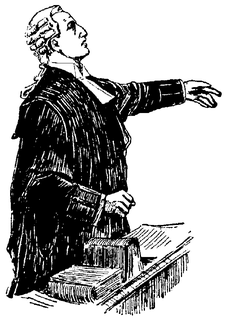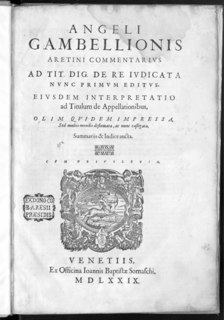 W
WIn law, common law is the body of law created by judges and similar quasi-judicial tribunals by virtue of being stated in written opinions. The defining characteristic of “common law” is that it arises as precedent. In cases where the parties disagree on what the law is, a common law court looks to past precedential decisions of relevant courts, and synthesizes the principles of those past cases as applicable to the current facts. If a similar dispute has been resolved in the past, the court is usually bound to follow the reasoning used in the prior decision. If, however, the court finds that the current dispute is fundamentally distinct from all previous cases, and legislative statutes are either silent or ambiguous on the question, judges have the authority and duty to resolve the issue. The court states an opinion that gives reasons for the decision, and those reasons agglomerate with past decisions as precedent to bind future judges and litigants. Common law, as the body of law made by judges, stands in contrast to and on equal footing with statutes which are adopted through the legislative process, and regulations which are promulgated by the executive branch. Stare decisis, the principle that cases should be decided according to consistent principled rules so that similar facts will yield similar results, lies at the heart of all common law systems.
 W
WAbatement of debts and legacies is a common law doctrine of wills that holds that when the equitable assets of a deceased person are not sufficient to satisfy fully all the creditors, their debts must abate proportionately, and they must accept a dividend.
 W
WA barrister is a type of lawyer in common law jurisdictions. Barristers mostly specialise in courtroom advocacy and litigation. Their tasks include taking cases in superior courts and tribunals, drafting legal pleadings, researching the philosophy, hypothesis and history of law, and giving expert legal opinions.
 W
WIn the common law of crime in England and Wales, a common scold was a type of public nuisance—a troublesome and angry person who broke the public peace by habitually chastising, arguing and quarrelling with their neighbours. Most punished for scolding were women, though men could be found to be scolds.
 W
WA court of equity, equity court or chancery court is a court that is authorized to apply principles of equity, as opposed to those of law, to cases brought before it.
 W
WEarl of Oxford's case (1615) 21 ER 485 is a foundational case for the common law world, that held equity takes precedence over the common law.
 W
WThe eggshell rule is a well-established legal doctrine in common law, used in some tort law systems, with a similar doctrine applicable to criminal law. The rule states that, in a tort case, the unexpected frailty of the injured person is not a valid defense to the seriousness of any injury caused to them.
 W
WIn jurisdictions following the English common law system, equity is the body of law which was developed in the English Court of Chancery and which is now administered concurrently with the common law.
 W
WFalsus in uno, falsus in omnibus is a Latin phrase meaning "false in one thing, false in everything." At common law, it is the legal principle that a witness who testifies falsely about one matter is not credible to testify about any matter. Although many common law jurisdictions have rejected a categorical application of the rule, the doctrine has survived in some American courts.
 W
WFarah Constructions v Say-Dee Pty Ltd also known as 'Farah' is a decision of the High Court of Australia.
 W
WIn the Middle Ages, especially under the European feudal system, feoffment or enfeoffment was the deed by which a person was given land in exchange for a pledge of service. This mechanism was later used to avoid restrictions on the passage of title in land by a system in which a landowner would give land to one person for the use of another. The common law of estates in land grew from this concept.
 W
WA fiduciary is a person who holds a legal or ethical relationship of trust with one or more other parties. Typically, a fiduciary prudently takes care of money or other assets for another person. One party, for example, a corporate trust company or the trust department of a bank, acts in a fiduciary capacity to another party, who, for example, has entrusted funds to the fiduciary for safekeeping or investment. Likewise, financial advisers, financial planners, and asset managers, including managers of pension plans, endowments, and other tax-exempt assets, are considered fiduciaries under applicable statutes and laws. In a fiduciary relationship, one person, in a position of vulnerability, justifiably vests confidence, good faith, reliance, and trust in another whose aid, advice, or protection is sought in some matter. In such a relation good conscience requires the fiduciary to act at all times for the sole benefit and interest of the one who trusts.A fiduciary is someone who has undertaken to act for and on behalf of another in a particular matter in circumstances which give rise to a relationship of trust and confidence.
 W
WIn contract law, impossibility is an excuse for the nonperformance of duties under a contract, based on a change in circumstances, the nonoccurrence of which was an underlying assumption of the contract, that makes performance of the contract literally impossible.
 W
WIn American estate planning parlance, an incentive trust is a trust designed to encourage or discourage certain behaviors by using distributions of trust income or principal as an incentive. A typical incentive trust might encourage a beneficiary to complete a degree, enter a profession, or abstain from harmful conduct such as substance abuse. The beneficiary might be paid a certain amount of money from the trust upon graduating from college, or the trust might pay a dollar of income from the trust for every dollar the beneficiary earns.
 W
WInsane delusion is the legal term of art in the common law tradition used to describe a false conception of reality that a testator of a will adheres to against all reason and evidence to the contrary. A will made by a testator suffering from an insane delusion that affects the provisions made in the will may fail in whole or in part. Only the portion of the will caused by the insane delusion fails, including potentially the entire will. Will contests often involve claims that the testator was suffering from an insane delusion.
 W
WIntestacy is the condition of the estate of a person who dies without having in force a valid will or other binding declaration. Alternatively this may also apply where a will or declaration has been made, but only applies to part of the estate; the remaining estate forms the "intestate estate". Intestacy law, also referred to as the law of descent and distribution, refers to the body of law that determines who is entitled to the property from the estate under the rules of inheritance.
 W
WA justice of the peace (JP) is a judicial officer of a lower or puisne court, elected or appointed by means of a commission to keep the peace. In past centuries the term commissioner of the peace was often used with the same meaning. Depending on the jurisdiction, such justices dispense summary justice or merely deal with local administrative applications in common law jurisdictions. Justices of the peace are appointed or elected from the citizens of the jurisdiction in which they serve, and are usually not required to have any formal legal education in order to qualify for the office. Some jurisdictions have varying forms of training for JPs.
 W
WIn common law jurisdictions, a personal representative or legal personal representative is a person appointed by a court to administer the estate of another person. If the estate being administered is that of a deceased person, the personal representative is either an executor if the deceased person left a will or an administrator of an intestate estate. In other situations, the personal representative may be a guardian or trustee, or other position. As a fiduciary, a personal representative has the duties of loyalty, candor or honesty, and good faith. In the United States, punctilio of honor, or the highest standard of honor, is the level of scrupulousness that a fiduciary must abide by.
 W
WThe posse comitatus, in common law, is a group of people mobilized by the conservator of peace – typically a sheriff – to suppress lawlessness or defend the county. The posse comitatus originated in ninth century England simultaneous with the creation of the office of sheriff. Though generally obsolete throughout the world, it remains theoretically, and sometimes practically, part of the United States legal system.
 W
WThe doctrine of privity of contract is a common law principle which provides that a contract cannot confer rights or impose obligations upon any person who is not a party to the contract.
 W
WIn the United Kingdom and in some Commonwealth countries, a Queen's Counsel during the reign of a queen, or King's Counsel during the reign of a king, is a lawyer who is a senior counsel in court cases; in important cases each side is typically led by one. Technically, they are appointed by the monarch of the country to be one of 'Her [His] Majesty's Counsel learned in the law'. The position originated in England. Some Commonwealth countries have either abolished the position, or renamed it so as to remove monarchical connotations, for example, ’Senior Counsel’ or 'Senior Advocate'.
 W
WRatione soli or rationae soli is a Latin phrase meaning "according to the soil" or "by reason of the ownership of the soil." In property law, it is a justification for assigning property rights to landowners over resources found on their own land. Traditionally, the doctrine of ratione soli provides landowners "constructive possession of natural resources on, over, and under the surface: cujus est solum, ejus est usque ad coelum ad infernos."
 W
WRes judicata (RJ) or res iudicata, also known as claim preclusion, is the Latin term for "a matter decided" and refers to either of two concepts in both civil law and common law legal systems: a case in which there has been a final judgment and is no longer subject to appeal; and the legal doctrine meant to bar relitigation of a claim between the same parties.
 W
WSimony is the act of selling church offices and roles or sacred things. It is named after Simon Magus, who is described in the Acts of the Apostles as having offered two disciples of Jesus payment in exchange for their empowering him to impart the power of the Holy Spirit to anyone on whom he would place his hands. The term extends to other forms of trafficking for money in "spiritual things".
 W
WSubrogation is the assumption by a third party of another party's legal right to collect a debt or damages. It is a legal doctrine whereby one person is entitled to enforce the subsisting or revived rights of another for one's own benefit. A right of subrogation typically arises by operation of law, but can also arise by statute or by agreement. Subrogation is an equitable remedy, having first developed in the English Court of Chancery. It is a familiar feature of common law systems. Analogous doctrines exist in civil law jurisdictions.
 W
WTerra nullius is a Latin expression meaning "nobody's land". It was a principle sometimes used in international law to justify claims that territory may be acquired by a state's occupation of it.
 W
WA trust is a three-party fiduciary relationship in which the first party, the trustor or settlor, transfers ("settles") a property upon the second party for the benefit of the third party, the beneficiary.
 W
WIn common law, a writ is a formal written order issued by a body with administrative or judicial jurisdiction; in modern usage, this body is generally a court. Warrants, prerogative writs, and subpoenas are common types of writ, but many forms exist and have existed.